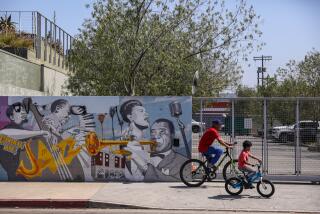Blacks, bigotry and Latino bias
- Share via
Re “Roots of anger,” Current, Jan. 7
Tanya K. Hernandez’s piece is filled with sweeping generalizations and accusations. She is way off when she refers to the killings and assaults by Latino gang members on unsuspecting African Americans as a “Latino ethnic cleansing of African Americans from multiracial neighborhoods.”
The people who are committing these horrendous acts are not representative of the Latino community. These delinquents are gang members. It is mind-boggling that Hernandez came up with the ignorant conclusion that the entire Latino culture is to blame. Her historical analysis is irrelevant to the racial gang problems in Los Angeles.
It has nothing to do with Latino history and has everything to do with Los Angeles gang culture. For Hernandez to blame Latino culture for these catastrophic acts is not only wrong but totally reprehensible. Hernandez obviously has no clue as to what is really going on in the streets of Los Angeles.
ADRIANA E. PADILLA
Los Angeles
*
I read Hernandez’s article with intense interest, often finding myself nodding in agreement. Although I believe the current violence between Latinos and African Americans that is plaguing some of our neighborhoods in Los Angeles is perpetrated by low-life thugs, it is certainly true that the roots of bigotry, against Africans and full-blooded Indians, run deep in Latin America and the Caribbean.
Having traveled a bit throughout this region, as a Peace Corps volunteer and on my own, I have found myself aghast at some of the ill-informed negative attitudes that Latin Americans will express against blacks even if they have never met one. But is it really a surprise to any observer of Latino culture that “whiteness” is preferred while “blackness” is despised? Look at the Latin music scene. From Luis Miguel and Marc Anthony to Shakira and Gloria Estefan, these artists all are unequivocally white, even if the music they sing has undeniable African roots. I believe this well represents the collective prejudices of the Latino community.
JOHN EDMONDS
Pasadena
*
I take exception to Hernandez’s conclusion that Latino-black tensions are mainly rooted in Latino prejudice. This message panders to an American audience that loves to hear that others share their history of prejudice. Certainly, anti-black beliefs are pervasive throughout the Americas to varying degrees. A major flaw in Hernandez’s thinking is equating Latino “racism” to the historical racism of the United States. The Latin American view of race is less categorical than that of the U.S. In Latin America, most bias literally depends on how dark skinned you are, unlike the U.S. where, if you have one drop of African blood, you are African American.
Moreover, the majority of Latinos in the U.S. are racially mixed. In fact, the harshest prejudice among Latinos depends on how “non-Spanish” you look, whether Indian, mestizo, black or other mixtures.
MARIO ASHLA
Rancho Palos Verdes


